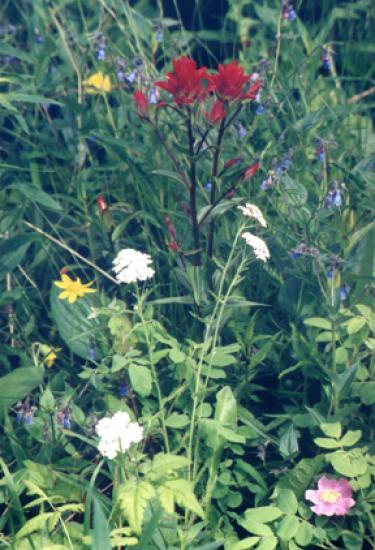Highland Council Invites New Applications For The Nature Restoration Fund
17th August 2022

The Highland Council is inviting communities to apply for a share of the 2022/23 allocation of the Nature Restoration Fund.
Established by the Scottish Government, the Nature Restoration Fund (NRF) is a capital fund designed to help support projects that will deliver nature restoration, safeguard wildlife, and tackle the causes of biodiversity loss due to climate change.
At last year's COP26, the Scottish Government announced further support of £55m over a five-year period to specifically target nature restoration projects. Of this, an annual allocation of £5m will be directly distributed to Local Authorities.
Chair of the Council's Environment and Infrastructure Committee, Cllr Ken Gowans said: "The purpose of the Nature Restoration Fund is to support positive actions that can help nature recover. During its first round, the Council decided to do an open call for community groups to bid into the fund.
"Grants between the value of £2,500 and £20,000 were awarded to 27 successful organisations throughout Highland. Projects approved included the creation of 13 new wildflower meadow sites, 17 tree planting initiatives, 7 areas of wetland creation or new wildlife ponds, and projects to remove invasive non-native species to enhance local habitats for protected species."
He added: "I am especially pleased that we opened the fund to be accessible to external organisations. It was encouraging to see so many projects coming forward which shows that people all over Highland are mobilising themselves to take local action against the climate crisis. I expect to see a high demand for funding again this year, so I encourage all eligible groups to submit their expression of interest before the deadline of Wednesday 31 August."
This year, there is an increased focus on outcomes which address the main drivers of the decline in biodiversity on land and seas particularly rural biodiversity. For example, where on land, over-exploitation of the natural environment and addressing its consequences, habitat loss and fragmentation, and removal of invasive non-native species. To deliver this aim, the fund has four strategic themes:
Habitat restoration - management for enhancement and connectivity
Freshwater restoration, including hydrological change
Eradication of invasive non-native species impacting on nature
Coastal and marine management to promote restoration and resilience
The capital funding allocated to Local Authorities is to support new, or to enhance existing, approaches that further biodiversity and which adhere to the following criteria:
deliver positive effects for biodiversity and enhance local ecosystems
address the climate emergency and its impacts through mitigation and adaptation and by promoting nature-based solutions
Capital items that could form that basis for spend may include, but are not limited to:
Action for pollinators (equipment for maintaining wildflower areas or verges including planting)
Improving condition and use of Local Nature Reserves (purchase and planting)
Developing a local nature network through planting of wildlife corridors, removal of barriers to wildlife movement and pollinator planting
Greening active travel routes (purchase and planting)
Natural flood management actions such as connecting rivers with flood plains, pond creation, de-culverting, in-stream works for habitat and flow variability
Removal of invasive non-native species (INNS) to improve the biodiversity value of the remaining habitat
Habitat and species enhancement works using native stock, enhancing natural coastal defences through marram, addressing coastal squeeze.
All projects should be ready to start before the end of March 2023 and be completed by the end of June 2023.
The minimum grant support available is £2,000 and the maximum is £25,000.
Applications are welcomed from constituted community groups; public sector bodies; charities; voluntary and social enterprises; co-operatives and community ownership initiatives; development trusts.
This is a competitive process, so the Council is highlighting that projects with secured match funding or in-kind contributions are likely to score higher during assessment. NRF can only fund capital expenditure that directly enhances biodiversity. Revenue costs such as project management are not eligible however labour costs to undertake the approved works will be accepted.
The Council is operating a two-stage process to apply for Nature Restoration funding. An expression of interest giving outline information on key facts and figures about your project should be submitted no later than Wednesday 31 August 2022.
For full information and further guidance please visit – www.highland.gov.uk/naturerestorationfund
Related Businesses
Related Articles
Exciting Career Opportunities With The Highland Council Now Open For Applications
# 10 December 2025 Career opportunities with The Highland Council The Highland Council is looking to fill a variety of posts relating to civil engineering and flood risk management based in locations across the area. Included are opportunities specifically for civil engineering graduates and technicians, providing the ideal job with career progression for anyone recently qualified and ready for a varied and interesting role.
What the NC500 Research Projects Are Designed to Do - and Why They Matter for the Highlands
As the North Coast 500 approaches its tenth anniversary, it has become one of Scotland's most well-known tourism success stories. The 516-mile loop around the far north of the Highlands has been celebrated internationally, marketed as a world-class road trip, and credited with transforming visitor numbers in some of Scotland’s most remote areas.Help Shape the Future of Thurso
The Highland Council is inviting people that live, work, or study in Thurso, to come along to the public consultation events to have their say. This is an opportunity to help shape the future of Thurso, to gather views and ideas.
Are Scottish Councils Quietly Reversing Outsourcing? A Look at Insourcing, Cuts and the Highland IT Shift
A notable article in the Guardian on 6 December 2025 noted the high sums being paid by London councils outsourcing services to private firms. The article starts with the reduction in council funding by UK government since 2010.Council welcomes Visitor Levy flexibility plan
The Highland Council welcomes moves by the Scottish Government to introduce greater flexibility on how it could design a Visitor Levy Scheme for consultation. The Visitor Levy (Scotland) Act 2024 currently provides local authorities with discretionary powers to implement percentage-based levies following statutory consultation.Highland Council is reaching out for views to shape its next 26/27 budget.
As it looks to set out its forthcoming priorities, the council is seeking involvement from members of the public, including businesses, community groups, parents, and young people. All their opinions are going to be crucial in deciding how Highland Council will take on its budget challenge for 2026-2027.Have your say in Thurso's future £100million investment by attending public consultation events
Thurso is to benefit from £100m investment in education and community facilities and are rolling out the first phase of public consultations on 9 and 10 December 2025. The Highland Council is inviting people that live, work, or study in Thurso, to come along to the public consultation events to have their say; this is an opportunity to help shape the future of Thurso, to gather views and ideas.Finding new owners for empty homes - Scheme launched to help return more empty homes to active use
A new online portal has been launched to bring empty homeowners together with prospective buyers or developers with the aim of facilitating more properties to be used as homes again. Covering the whole of Scotland, this builds on the success of local pilots, referred to as "matchmaker schemes".Consideration for short term let control area in Skye and Raasay
Steps towards introducing a short term let control area have been considered by Highland Council's Isle of Skye and Raasay area committee. On Monday (1 December 2025) the committee heard evidence to justify the grounds for the introduction of a Short Term Let Control Area covering all or part of Skye and Raasay.Workforce North event spotlights Highland economy
EMPLOYERS and educators from across the Highlands have gathered to hear how a new initiative is aiming to transform the region's economy. Workforce North - A Call to Action brought together business leaders and teachers from primary and secondary schools from across the Highland Council area with a wide range of partners geared towards education, learning and skills development at Strathpeffer Pavillion.
